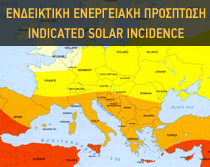 Tourists visiting the Spanish island of Tenerife will soon be able to stay in the world's first bioclimatic holiday village.
Tourists visiting the Spanish island of Tenerife will soon be able to stay in the world's first bioclimatic holiday village.
Each of the 25 energy self-sufficient houses has been built to a different design using different technologies and will serve as a living experiment in sustainability.
The houses will double as science laboratories and holiday homes, with sensors constantly feeding back information on their temperature, humidity and air movement to determine which techniques are the most efficient.
The project, developed by Tenerife's Instituto Tecnológico y deEnergías Renovables, came about after the region's president Ricardo Melchior Navarro said more needed to be done to protect the island's scarce resources.
Tenerife is in the Canary Islands, about 800 miles from mainland Spain and 185 miles from the coast of Africa.
Miren Iriarte, the project's development manager, told CNN: "We have a lot of tourists coming to our island consuming a lot of energy and water. In an isolated community where we have to generate all our own energy this could be a problem.
"We know that 50 percent of all energy is used in houses, so it's a big step to create houses which are self-sufficient."
After 15 years of development and at a cost of €10 million (U.S. $13 million), the houses will finally be ready for rent this winter.
Each of the homes has been designed by a different architect from around the world. The international tender attracted 397 submissions from 38 countries, from which 25 were chosen.
The houses are each designed specifically to suit their particular location, using thickness of walls, orientation to the sun, solar panels, plants, water and wind to control their temperature and generate all their own electricity needs.
Many of the houses are built partly underground to help keep them cool. All the village's water comes from the sea via its own desalination plant. They are built from materials that are natural, recycled or recyclable.
"The houses are living laboratories," said Iriarte.
"They have been designed for maximum comfort and we want people to enjoy the experience, but they will also be helping us to test which houses work perfectly and which need improving.
"Eventually these houses can be replicated anywhere that has a hot climate similar to ours."
The three-bedroom houses will cost between €200 and €280 (U.S. $260 to $365) per night to rent. No conventional cars will be used in the village, but electric cars and bicycles will be available for guests to use.
There is also a visitor's center in the village to give information on the technology used.
The project took 15 years to complete because of difficulties finding building contractors to construct the complicated and unique designs.
Iriarte said: "Five of the homes were built by an outside company, but we did the others ourselves, employing architects, builders and technicians directly."





